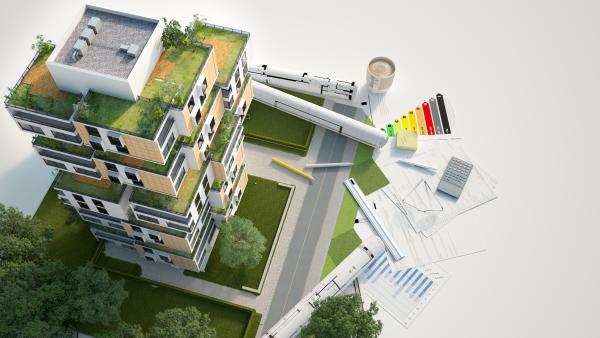
- A €300 million loan will support Hungary’s Home Renovation Programme and co-finance energy efficiency improvements in homes, with up to €8 500 per household.
- The loan will support the energy efficiency retrofit and upgrade of residential buildings and the installation of domestic renewable energy systems across the country, reducing energy bills for households as well as energy demand in Hungary, and cutting greenhouse gases and air pollution.
- Only 1% of buildings in the European Union undergo energy-efficient renovation every year, making programmes like the Home Renovation Programme key for the success of the European Green Deal.
The European Investment Bank (EIB), the bank of the European Union, will provide €300 million to the Ministry of Finance of Hungary to co-finance the Hungarian government’s national Home Renovation Programme to improve the energy efficiency of homes and reduce energy costs.
Hungary’s Home Renovation Programme will use the EIB funds to co-finance the energy efficiency retrofit of homes and the installation of domestic renewable energy generation systems. The programme was launched on 1 January 2021 and offers reimbursements for half of the renovation costs. The maximum amount of the reimbursement is HUF 3 million (approximately €8 500) per household.
This is the first ever EIB loan under the new green loan label signed in Central and South-Eastern Europe. It accelerates Hungary’s green transformation into a carbon-neutral economy, as well as plans under the European Green Deal to transform the European Union into a carbon-neutral economy by 2050. The EIB financing will also help achieve the goals set in the European Commission’s Renovation Wave for Europe initiative.
EIB Vice-President Teresa Czerwińska, who is in charge of EIB operations in Hungary, said: “Today we are making history with the first ever EIB green loan signed in Hungary. The loan is a triple win for Hungarians, the European Union and the global climate, and an important step towards delivering on the ambitious goals of the European Green Deal. It will enable Hungarians to improve their quality of life and save money thanks to lower energy bills as a result of more energy-efficient homes. Loans like this will help the European Union become carbon neutral faster, and in turn contribute to the success of global climate action. Hungary was among the first EU countries to ratify the Paris Agreement as the global roadmap to address the existential threat brought by rising global temperatures. As the EU bank, we are glad we can support Hungary’s green ambition and its transformation into a green and sustainable society.”
The operation will support investments in reducing energy demand and improving both the reliability and security of supply in the country. In parallel, financing from the EU bank will help reduce greenhouse gases and alleviate air pollution. Energy efficiency investment will generate local and regional economic activity and thus increase employment.
Hungarian households consume 34% of the country’s total energy, which is more than transport (24%) or industry (23%), making investments in the energy efficiency of homes key for meeting the carbon-neutral ambitions.
On the national level, the loan accelerates the National Energy Strategy and the National Energy Efficiency Action Plans, which designate energy efficiency as a national priority and call for reduced energy imports, improved energy security and increased energy affordability.
Energy efficiency of homes key to successful climate action
Improving energy efficiency has a key role to play in achieving carbon neutrality, as buildings in the European Union are responsible for 40% of our energy consumption and 36% of greenhouse gas emissions. On top of reducing emissions of greenhouse gases, home renovations and measures to improve the energy efficiency of homes enhance people’s quality of life, improve public health and create additional green jobs in the construction sector.
According to the European Commission, only 1% of buildings in the European Union undergo energy-efficient renovation every year. Currently, roughly 75% of buildings in the European Union are not energy efficient. Investment in energy efficiency will also bring additional social and economic benefits to nearly 34 million Europeans who cannot afford to heat their homes properly.
Renovating buildings is essential, and has been singled out in the European Green Deal as a key initiative to drive energy efficiency in the sector and deliver on objectives. In 2020, the European Commission published its strategy to boost renovation in the European Union — a renovation wave for Europe. It pursues a dual ambition of energy gains and economic growth and aims to double annual energy renovation rates in the next ten years.
EIB in Hungary:
EIB lending commitments in Hungary since the start of the Bank’s activity in the country are currently close to €21.6 billion. Between 2008 and 2018 alone the EIB signed for support worth €13 billion. EIB operations cover important sectors of the Hungarian economy, including transport, the environment, energy infrastructure, manufacturing and services.
Another key component of the Bank’s activity in Hungary is the promotion of small and medium-sized enterprises (SMEs) by increasing their access to long-term financing through local financial institutions. Since 2001, the EU bank has supported 5 172 Hungarian SMEs, sustaining 263 767 jobs in the process.
For additional information on the potential for investment in energy efficiency in Hungary please consult the EIB Fi-Compass report for 2020.